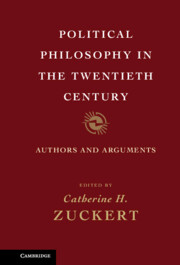Book contents
- Frontmatter
- Contents
- Contributors
- Introduction: political philosophy in the twentieth century
- Part I The three basic alternatives in the early twentieth century
- Part II ??migr?? responses to World War II
- Part III The revival of liberal political philosophy
- 8 Friedrich Hayek on the nature of social order and law
- 9 Michael Oakeshott: the philosophical skeptic in an impatient age
- 10 Moral pluralism and liberal democracy: Isaiah Berlin's heterodox liberalism
- 11 H. L. A. Hart: a twentieth-century Oxford political philosopher
- 12 John Rawls and the task of political philosophy
- 13 Richard Rorty: liberalism, irony, and social hope
- Part IV Critiques of liberalism
- Index
- References
12 - John Rawls and the task of political philosophy
Published online by Cambridge University Press: 05 June 2012
- Frontmatter
- Contents
- Contributors
- Introduction: political philosophy in the twentieth century
- Part I The three basic alternatives in the early twentieth century
- Part II ??migr?? responses to World War II
- Part III The revival of liberal political philosophy
- 8 Friedrich Hayek on the nature of social order and law
- 9 Michael Oakeshott: the philosophical skeptic in an impatient age
- 10 Moral pluralism and liberal democracy: Isaiah Berlin's heterodox liberalism
- 11 H. L. A. Hart: a twentieth-century Oxford political philosopher
- 12 John Rawls and the task of political philosophy
- 13 Richard Rorty: liberalism, irony, and social hope
- Part IV Critiques of liberalism
- Index
- References
Summary
John Rawls was born on February 21, 1921. This makes him considerably younger than most of the thinkers treated in this volume, who were born around the turn of the twentieth century or well before that. Rawls was born almost forty years after Carl Schmitt (b. 1888) and more than sixty years after John Dewey (b. 1859). The year Rawls was born, Isaiah Berlin turned twelve and fled Russia with his family to settle in England. Of the eighteen thinkers commemorated here, only five others – Michel Foucault (b. 1926), Alasdair MacIntyre (b. 1929), Jürgen Habermas (b. 1929), Charles Taylor (b. 1931), and Richard Rorty (b. 1931) – were of roughly Rawls's generation.
Generational divides are not all that puts Rawls in the minority in this volume. But for Dewey and Rorty, he is the only American by birth. With the qualified exceptions of Dewey and Rorty, he is the only one whose thought emerged from a formation in liberal Protestantism. Although Dewey wrote his dissertation on Kant and there are obviously Kantian themes in Habermas's work, Rawls is the most Kantian of the thinkers treated here. Like Taylor and MacIntyre, and unlike most of the others, Rawls's intellectual roots run through the Oxford of the mid-twentieth century (where Rawls spent a critical year with Berlin and Hart). More than anyone else discussed in this volume, Rawls found the techniques, the rigor, and the inherited problematics of analytic philosophy congenial. He was considerably more sympathetic to utopian political thinking than most others, asking what an ideally just liberal democracy would be like. He developed a systematic philosophical theory to answer that question.
- Type
- Chapter
- Information
- Political Philosophy in the Twentieth CenturyAuthors and Arguments, pp. 185 - 197Publisher: Cambridge University PressPrint publication year: 2011

